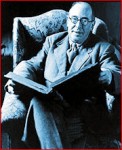In my last post I highlighted C.S. Lewis's take on what it means to approach the Bible humbly: namely, we should first ask honestly and with an open mind, What sort of book has God actually given us and how has He given it? When we do that, we find that God has given us a Book not at all like what we might have expected if we had formulated a doctrine of Scripture a priori. Instead He has given us something else entirely, something far more extraordinary: The same divine humility which decreed that God should … [Read more...] about C.S. Lewis on Scripture. God’s Word in Human Words. Part 2 of 2
Reflections on the Psalms
C.S. Lewis on Scripture. God’s Word in Human Words. Part 1 of 2
I am always thankful that the first theology book I ever read was C.S. Lewis's Mere Christianity. I stumbled upon it in the B. Dalton Bookseller at the local mall early in the summer before my senior year in high school, was intrigued, took it home and devoured it in less than a day. From then on I read anything I could get my hands on by Lewis: Miracles, The Great Divorce, God in the Dock: Essays on Theology and Ethics, The Abolition of Man, you name it. Lewis's clarity, cleverness, creativity, intelligence, and … [Read more...] about C.S. Lewis on Scripture. God’s Word in Human Words. Part 1 of 2
C.S. Lewis’ humility in reflecting upon the Psalms
This is not a work of scholarship. I am no Hebraist, no higher critic, no ancient historian, no archaeologist. I write for the unlearned about things in which I am unlearned myself. If an excuse is needed (and perhaps it is) for writing such a book, my excuse would be something like this. It often happens that two schoolboys can solve difficulties in their work for one another better than the master can. When you took the problem to a master, as we all remember, he was very likely to explain what you understood already, … [Read more...] about C.S. Lewis’ humility in reflecting upon the Psalms


